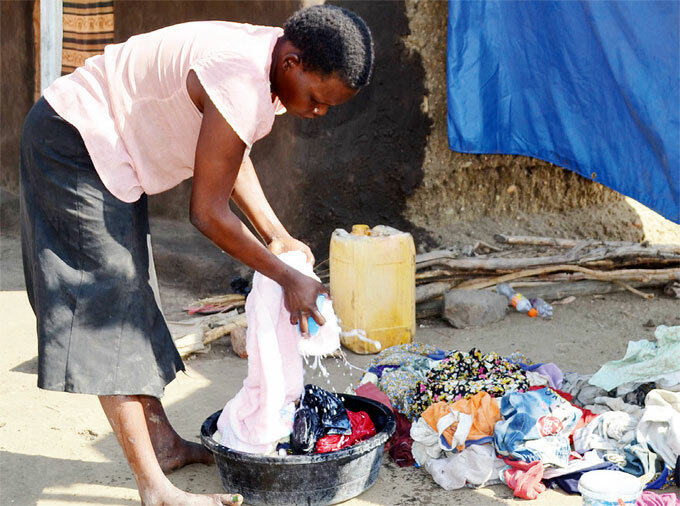Human trafficking hurts labour market
The congress made it mandatory on the labour organisations of all countries of the world to honour May 1
By Jacky Achan
When it comes to labour export, the sector has been shrouded with controversy over exploitation and mistreatment of labourers, both from their recruiters and employers.
At the height of these complaints, the Government in 2016 banned sending Ugandan girls to work as housemaids to Saudi Arabia. This despite having an agreement in place with the wealthy Gulf nation to ship domestic workers there.
The Government demanded that Saudi Arabia put in place a condusive work environment. Eventually, the ban was lifted last year. But the distress is welldocumented.
Migrant rights, in their online publication, cited the suffering of one Irene Nabbanja, who, upon leaving her workplace and demanding to return home because of unfavourable working conditions, was locked up in a room by her recruitment agent. In trying to escape, she fell from the fourth floor and severely injured her spinal cord. Some of the girls rescued by the Ministry of Gender, Labour and Social Affairs from the city of Riyadh in Saudi Arabia with permanent secretary, Pius Bigirimana. The girls said they were tortured and sexually harassed by their employers.
Some of the girls rescued by the Ministry of Gender, Labour and Social Affairs from the city of Riyadh in Saudi Arabia with permanent secretary, Pius Bigirimana. The girls said they were tortured and sexually harassed by their employers.
Disabled, her agent threatened to abandon her if her family did not raise money for an air ticket to return her home. Eventually, her family managed to get her the air ticket that enabled her return home.
But that's not all. A parliamentary report documenting the deaths of Ugandans in the Middle East found that 48 workers had died in the first eight months last year, 35 of whom had allegedly committed suicide. Kameraho says given the current unemployment challenges in the country, labour export is unavoidable
Kameraho says given the current unemployment challenges in the country, labour export is unavoidable
Ngora County MP David Abala, who headed the committee, said he was shocked by the findings of their field visit. He said rape, torture, unpaid wages and confinement were some of the chief reasons behind the suicide cases.
"Ugandan maids are treated like slaves and are not allowed to eat the same food as their employers or even use the same plates," he said.CLICK HERE FOR MORE ON THIS STORY
How positive public spirit can foster Uganda's development
By Owen Wagabaza
What started as International Workers' Day in Chicago in May 1886 further spread to other parts of the world, Uganda being no exception. In 1884 the National Federation of Organised Trades and Labour Assemblies decided to call for a general strike on May 1, 1884 in the US, to enforce demands for employers to observe the eight-hour day.
Prior to the strike, workers were working for more than 12 to 16 hours a day and in unsafe conditions. Because of the many working hours, workers were getting sick and injured, yet with little help from the employers. During the protests, the Police while trying to disperse the protestors fired into the crowd, killing four people.
In 1886, the second international Socialist Conference chose May 1, as the International Workers' Day. The day was formally recognised as an annual event at the International's day second congress in 1891. In 1904, the international socialist congress in Amsterdam called on all social democratic party organisations and trade unions of all countries to demonstrate energetically on May 1 for the legal establishment of the eighthour workday. Workers in a factory operating machinery which stretches yarn used for fishnets
Workers in a factory operating machinery which stretches yarn used for fishnets
The congress made it mandatory on the labour organisations of all countries of the world to honour May 1, as the day for workers. For long, the day was a focal point for demonstrations by various groups of people, advocating for better labour laws. The day has since become one of the most important holidays in the world.
The day is celebrated around the world with trade unions advocating for better labour policies through demonstrations, workshops and conferences and many other ways.
Promoting public spirit The celebrations for this year's Labour Day are being held in Sembabule under the theme Promoting the public spirit in the public sector. Apollo Onzoma, the acting commissioner in the labour ministry says public spirit refers to loving or caring for the nation the way an ordinary person cares for their personal interests.
"Public spirited persons identify themselves with the interests of the nation and make those interests their own. Similarly, a public-spirited person shields the nation from anything that can harm it," Onzoma says.
The public sector in Uganda's context refers to central government ministries, departments and agencies as well as local governments. Onzoma explains that unlike the private sector, the public sector institutions are not only owned and operated by government, but they also exist to solely provide services to the citizens.
"The choice of the theme is informed by the fact that whereas public servants like all workers seek employment as a means to a livelihood. They also have an overarching obligation to serve and act in the public interest," Onzoma says.CLICK HERE FOR STORY DETAILS
Commission fights for the marginalised
By Betty Amamukirori
In March 2017, Alice Pikwo, an employee with Nile coaches, a bus company, was abruptly terminated by her superviser with no explanation. They had not paid her for three months. Her efforts to inquire into her sudden termination and get her three month salary hit a snag.
No one could explain to her what she had done wrong. As a vehicle inspector, she was earning sh150,000 per month. "They had stopped me from working for no reason. Even when I went to them several times, they refused to pay me my money. The superviser could not even listen to me. He was so arrogant," she told New Vision in an interview.
Pikwo said after the several failed attempts to get her pay, a friend advised her to file her complaint with the Equal Opportunities' Commission (EOC). In June 2017, she filed her complaint and after four months of mitigation between her and her former employer, she was finally paid. Tea picking may be seen as one of the activities for the marginalised
Tea picking may be seen as one of the activities for the marginalised
"Those people (EOC) helped me. They were so sympathetic," she said.
Sheila Ajo the public relations officer, EOC says they receive a minimum of 15 cases of a similar nature every month. "We handle those that fall under our docket and refer the others to the relevant bodies such as the Human Rights Commission," she said.
Sylvia Ntambi, the chairperson EOC, says 51% of the complaints they receive are from women while 49% were filed by men. She adds that most of the complaints arise from the central region. Ntambi explains that as EOC, they are committed to redressing social imbalances in the Ugandan Society.
This year, Labour Day will be celebrated under the theme Promoting the Public Spirit in the Public Sector. Ntambi noted that this year's theme augurs well with the national constitutional obligation of the Commission of eliminating discrimination and marginalisation against any individual or groups of persons by redressing societal imbalances through taking affirmative action and promoting equal opportunities for all.
"To this end, the commission envisions a just and fair society wherein all persons have equal opportunity to participate in, and benefit from all spheres of political, economic, social and cultural life," she said.
Ntambi explained that to fulfil this vision, they have been able to receive, assess and investigate complaints and determine their merit based admissibility or inadmissibility in light of the Commissions mandate. She notes that the EOC's mandate is to eliminate all forms of discrimination, marginalisation and promote equal opportunities for all.
"Complaints outside our mandate are referred to other relevant institutions. The admissible complaints usually take the form of alternative dispute resolution, before engaging the Commission's Tribunal," she further said.
Ntambi stated that they are also conducting research studies and audits on the dynamics of inequalities, discrimination and marginalisation among the population; and making policy recommendations on action areas to address imbalances and promote equal opportunities for all.CLICK HERE FOR STORY DETAILS
Women bear brunt of unpaid labour
By Stella Naigino
Would you work as an administrator for a big company without hope of ever getting paid? Would you still carry out your duties month after month diligently without even an allowance?
That is highly unlikely, however, that is the plight of many stay-home mothers. Alice Namugwana is one such mother. She quit her full-time job at Uganda Christian University to raise her three children aged two to six after she failed to get a reliable maid. A woman washing clothes
A woman washing clothes
"I do not get paid for doing this, but the peace of mind that I get as a mother ensuring that my children are safe under my care, keep me going," Namugwana says. Besides that, my husband is very supportive. He provides all we need. Other things that I feel I need as a woman will come later after my children have grown," she adds.
For teacher Florence Wagaba, leaving her children with a maid in order to earn sh200,000 per month did not make sense. "I tried to work, but whenever I went back home, my children complained about how the maid treated them. At first, I ignored them, but later realised that I had to prioritise their wellbeing.
I quit my job and started a nursery school at home. This helped me kill two birds with one stone," she adds.
According to a 2013 study on women's uncompensated work by ActionAid, women usually engage in work that is never paid for cooking, cleaning, taking care of children and collecting firewood, among others. Some educated women are known to quit their good jobs to take care of their homes and ensure their husbands return home to hot meals, warm baths and ironed clothes. Most men do not deem such work as worthy of pay
Some educated women are known to quit their good jobs to take care of their homes and ensure their husbands return home to hot meals, warm baths and ironed clothes. Most men do not deem such work as worthy of pay
The study noted that women's unpaid daily tasks amount to a massive amount of time, energy and ingenuity that has been historically exploited and undervalued. The study also revealed that in addition to doing house work and staying home to care for children, women get involved in subsistence farming, which makes them spend more hours working than even their male counterparts.
The more time they spend working at home, the more they are left behind when it comes to catching up on what's going on in the world. The study shows that in Uganda, more women head households than in other countries.
There were differences between rural and urban women, with rural women spending more time on unpaid GDP work. Women in Pallisa mainly worked on their families' small plots of land, farming both food and cash crops and looking after livestock, which are types of work that are generally unpaid. Women in periurban Bwaise worked as small scale traders, domestic workers and bar attendants.CLICK HERE FOR MORE ON THIS STORY
ADVERTS
UGANDA NURSES AND MIDWIVES COUNCIL
UGANDA COFFEE DEVELOPMENT AUTHORITY
UGANDA ELECTRICITY TRANSMISSION COMPANY LIMITED
UGANDA ELECTRICITY DISTRIBUTION COMPANY LIMITED
HIGHER EDUCATION STUDENT'S FINANCING BOARD
COTTON DEVELOPMENT ORGANISATION